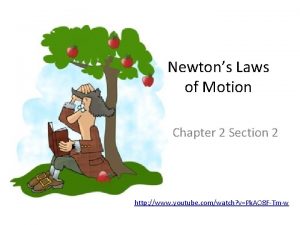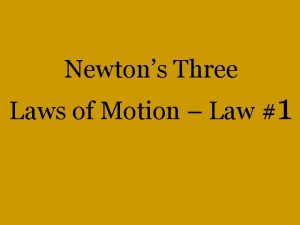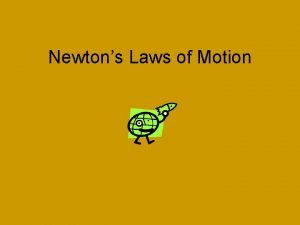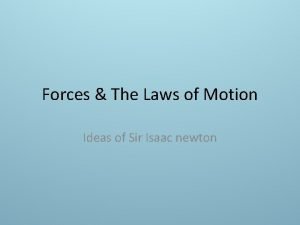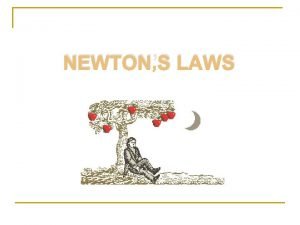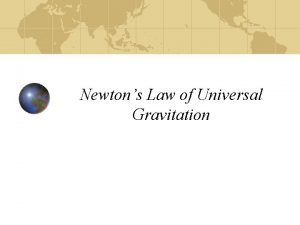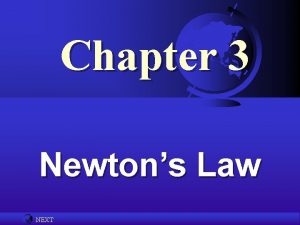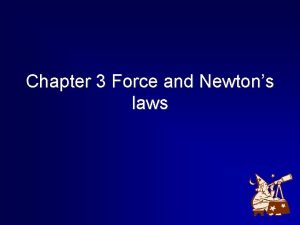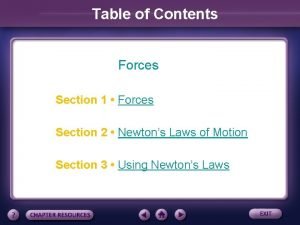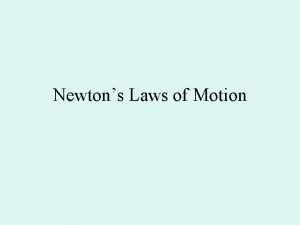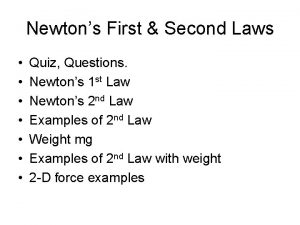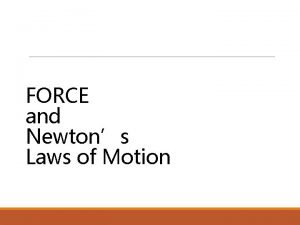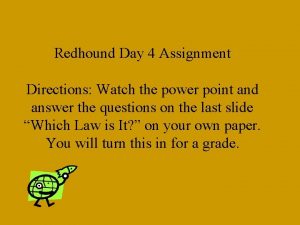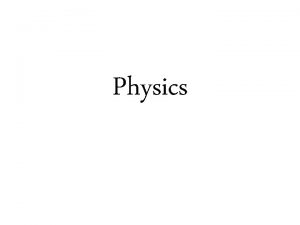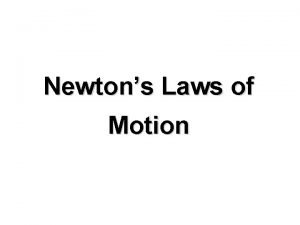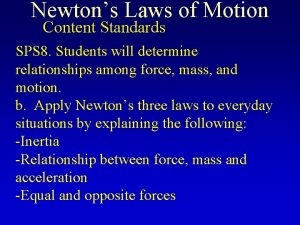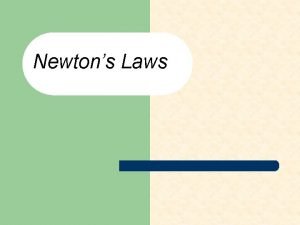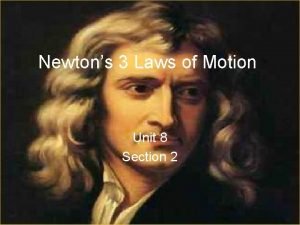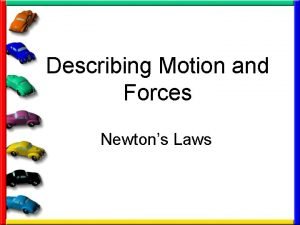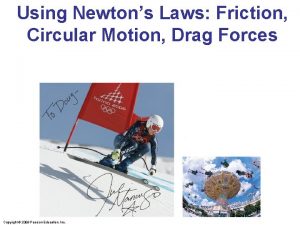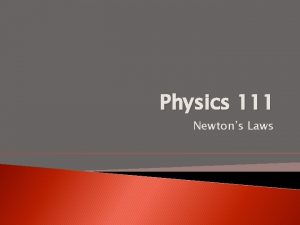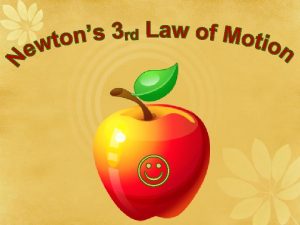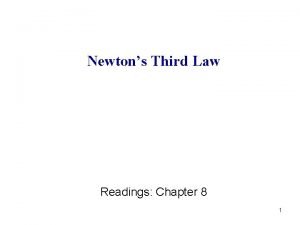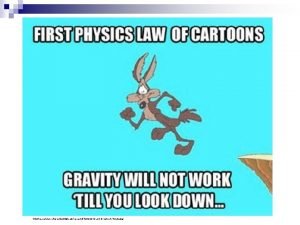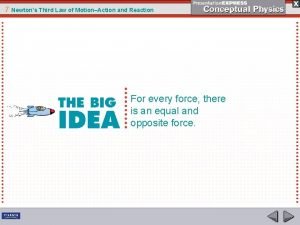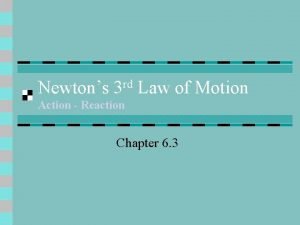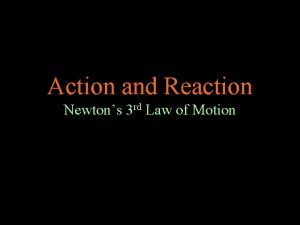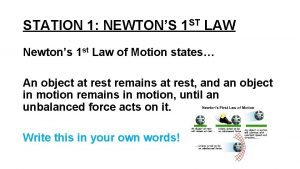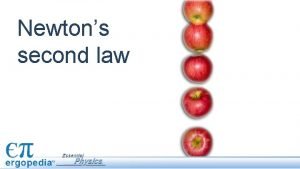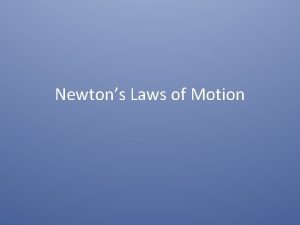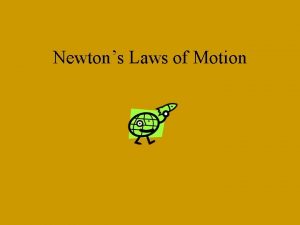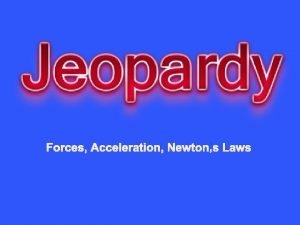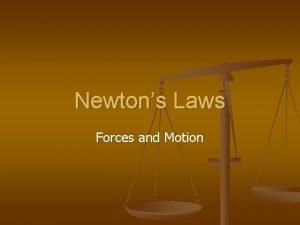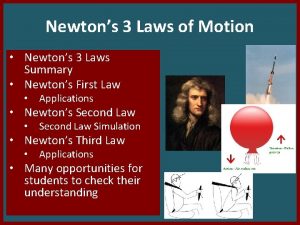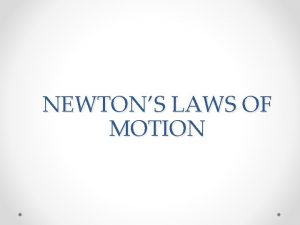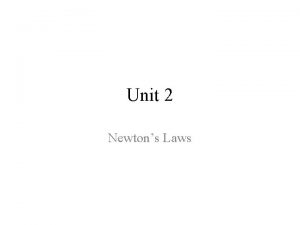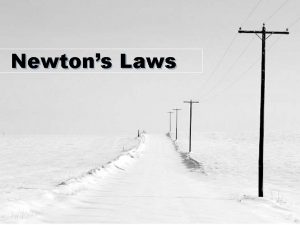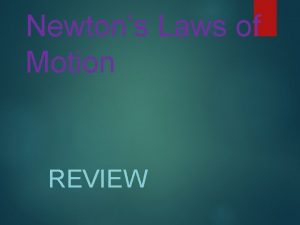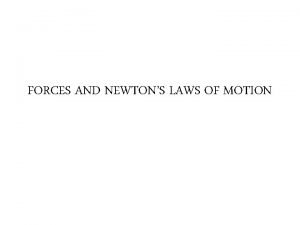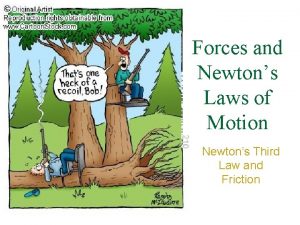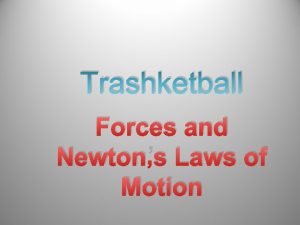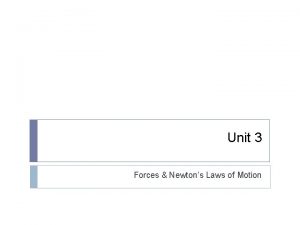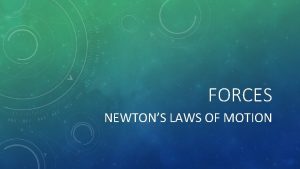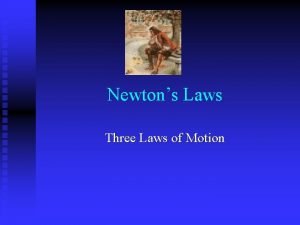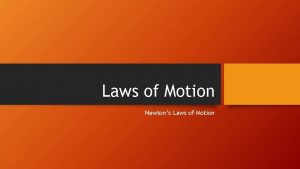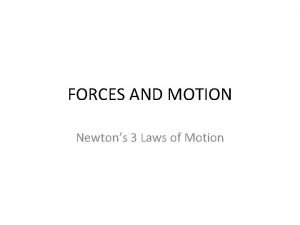Forces and Newtons Laws of Motion Forces A


































- Slides: 34

Forces and Newton’s Laws of Motion

Forces A force is a vector quantity (has magnitude and direction) that is typically described as a push or pull. Forces cause objects to accelerate (change velocities) if they are unbalanced. Forces that are in equilibrium are balanced and therefore cause no change in motion. Balanced Forces No Acceleration Force (cow on chair} Unbalanced Forces Acceleration FN Weight

Types of Forces 1. Contact Forces - two interacting objects are physically in contact with each other Examples: friction, tension, and applied forces

Types of Forces • 2. Field or (Action-at-a-distance) Forces two interacting objects are not in physical contact with each other Examples: gravitational forces (9. 81 m/s 2 on Earth), electric and magnetic forces electricity magnetism

Free-Body Diagrams Free-body diagrams (FBDs) are graphical representations of objects where all forces acting ON the object are represented. Forces exerted by the object on other objects are not included in the diagram. FBDs are used to analyze situations. When you isolate an object, and identify all of the forces acting on it, you can predict how the object will move.

Video

Newton’s First Law of Motion, also known as the Law of Inertia, states that a body in motion will remain in motion at a constant velocity, and a body at rest will remain at rest unless acted upon by an unbalanced force. Inertia is the resistance of an object to changes in its motion.

More on Inertia Galileo, the premier scientist of the 17 th century, developed the concept of inertia. Galileo reasoned that moving objects eventually stop because of a force called friction. Mass is a measure of inertia.

The man continues to move forward because he has inertia. Question: If you were the man, what could you do to stop yourself from flying over the hood of the car? Answer: Wear a seatbelt. The seatbelt provides the unbalanced force to stop the body in motion.

Implications of Newton’s First A body in motion at constant velocity does not necessarily require a force to keep it in motion at constant velocity. If there were no friction, objects would continue to move at the same speed in the same direction indefinitely.

Implications of Newton’s First Any forces acting on a body in motion at constant velocity MUST be balanced. Consider a bird carrying an egg descending at a constant velocity: Force of Bird = Weight


What happens if the forces were unbalanced? Acceleration

Balanced and Unbalanced Forces • Balanced Force – forces on an object that have the same magnitude but acting in opposite directions cancel each other • Unbalanced Forces – forces that do not cancel each other. Unbalanced forces cause a change in the state of motion.


Newton’s Second Law Forces mass acceleration summation

SI Unit for Forces The newton (N) is the SI unit force… the pound is the English unit force. One newton is the force required to accelerate a mass of 1 kg at a rate of 1 m/s 2

• How much force does the man need to apply to the car to accelerate it. 05 m/s 2? • • F = ma F= 1, 000 kg *. 05 m/s 2 F= 50 kg*m/s 2 F= 50 N

Newton’s Second Law F is the summation of forces acting on the object under consideration. F may also be called the net force, or the unbalanced force. Let’s consider the free-body diagrams below:

Unbalanced Forces • Since force is a vector, an unbalanced force exists whenever all vertical and/or horizontal forces do not cancel out.

Determining the Net Force Ftens = 1200 N Fnet = 400 N, up Fgrav = 800 N Fnorm = 50 N Ffric = 20 N Fgrav = 50 N Fnet = 20 N, left

• If a net force is applied in the same direction as an object is moving, then the object’s speed will increase.

A NET force applied in the opposite direction of an object’s motion will decrease the speed of the object.

A NET force applied at an angle to the movement of an object will change the direction (and sometimes the speed) of the object.

Implications of Newton’s Second Bigger forces yield bigger accelerations on the same mass. 10 N m = 5 kg 50 N m = 5 kg F = ma 10 N = 5 kg (a) a = 2 m/s 2 F = ma 50 N = 5 kg (a) a = 10 m/s 2

Implications of Newton’s Second Forces accelerate smaller masses more than larger masses. 10 N m = 2 kg m = 4 kg F = ma 10 N = 2 kg (a) a = 5 m/s 2 F = ma 10 N = 4 kg (a) a = 2. 5 m/s 2

Newton’s Third Law of Motion For every action, there is an equal and opposite reaction. Video Rocket landinghtt p: //phet. co lorado. edu /en/simula tion/lunarlander

Implications of Newton’s Third If you push/pull on something, it pushes/pulls back on you with an equal but opposite force. Forces always occur in pairs, called action/reaction pairs.

Action- Reaction

• Action: Object A exerts a force on object B • Reaction: Object B exerts a force on object A • Incorrect for situation: Apples falls to ground – Action: Earth pulls Apple – Reaction: Apple falls to the ground • Correct – Action: Earth pulls Apple – Reaction: Apple pulls Earth

And Even More

The Forces Acting ON an Object Determine its Motion The action/reaction pairs are forces that are exerted on two objects by each other. Why does anything move? These forces seem to cancel.

Action/Reaction on different masses • If the force on the apple and the Earth is equal, why does the apple move but the Earth does not move? • Acceleration depends on force and mass. The force are the same but the masses are not. • The Earth has a large mass, so it has a very small acceleration. • The apple has a small mass and a large acceleration

The force the bug exerts on the car, and the force the car exerts on the car are EQUAL F = F bug mbug car a m bug = car acar These forces do not cancel each other out because the forces are exerted on objects with different masses.
 Newtons laws od motion
Newtons laws od motion Newtons first lw
Newtons first lw Newton three law of motion
Newton three law of motion 3 laws of motion
3 laws of motion Derek leaves his physics book on top of a drafting table
Derek leaves his physics book on top of a drafting table Newton's law
Newton's law Problem 3
Problem 3 What are newtons 3 laws
What are newtons 3 laws Third law of newton
Third law of newton Section 3 using newtons law
Section 3 using newtons law Section 3 using newtons laws
Section 3 using newtons laws Elevator bank
Elevator bank First law of motion facts
First law of motion facts Newton's first and second law quiz
Newton's first and second law quiz Newtons laws definitions
Newtons laws definitions Newtons three law
Newtons three law Newton's laws
Newton's laws Newton's all laws
Newton's all laws Newton (unit)
Newton (unit) When the pellet fired into the spiral tube
When the pellet fired into the spiral tube What are the laws of newton
What are the laws of newton Law of force and acceleration
Law of force and acceleration Law of friction
Law of friction Ethan is dragging a bag of grass
Ethan is dragging a bag of grass Newtons 3 rd law of motion
Newtons 3 rd law of motion Newtons 3 rd law of motion
Newtons 3 rd law of motion Newtons third law of motion
Newtons third law of motion Rd law
Rd law Newton's first law meme
Newton's first law meme Newtons third law
Newtons third law Newtons third law of motion
Newtons third law of motion Newtons 3 rd law of motion
Newtons 3 rd law of motion Newtons 3 rd law of motion
Newtons 3 rd law of motion Station law
Station law Application of newton's law
Application of newton's law

